Last week marked the Summer Solstice, the official first day of summer. Growing up in New Hampshire, I would have finished school mere days ago, having spent the prior weeks breathlessly counting the minutes until the final bell rang and I could be carefree for a few months. The beginning of summer marked a time of big hopes and dreams, the wonder of endless possibilities, and of potentially life-changing movements that would alter our beings down to our DNA.
Growing up, nothing represented the promise of summer more than camp. Over the course of a few weeks, I could get out of my routine, meet people I would never meet otherwise, and focus my attention on swimming, adventure, crafts, and campfires. Camp lives in my memory in three phases, in childhood media, in my years as a camper, and my three summers as a counselor. Each brings different levels of nostalgia, expectations met and missed, and a level of meaning and change that helped me grow into the person I am today.
I always knew I was destined to be a camp kid. Before I ever went to camp myself, I devoured shows, movies, and books about camp. It all started with Salute Your Shorts,1 a Nickelodeon sitcom set at the fictional Camp Anawanna. The show’s ragtag tweens navigated the awkwardness of puberty, crushes, and pranks while trying to avoid pissing off Ug, their dim-witted counselor. I was transfixed by the dynamics between each character who represented different tropes: the bad boy, the sidekick, the tomboy, the preppie, the flower child, the genius, and the designated pretty girl. How they were motivated by their crushes, by who had better status at camp, by supporting their cabinmates, and by their connection to their activities. They were both at the mercy of one another’s whims, but also in charge of their own camp destinies. They could band together to get back at Ug, to avoid the shame of having their underwear hoisted up the flagpole (hence: salute your shorts), or being victim of the ultimate punishment: the Awful Waffle.2 They were figuring out who they were, boys and girls together. To me, these kids seemed endlessly adult, even as they dealt with the same problems I had. Salute Your Shorts enhanced my idealized wonder of camp; the promise of a new limitless life that felt older, cooler, and more fun than the one I was living.
Other summer camp movies like Camp Nowhere and Heavyweights and shows like Bug Juice gave me the high expectations that I could find love at camp at the end-of-summer dance with the boys camp across the lake. That my cabin would come together against all odds and beat our rivals at the all-camp competition. That my camp friends would be my BFFs and long distance pen pals. That I could learn skills that would put me way ahead in school. That I would return from camp an older, wiser woman. I longed for this life.
That wasn’t quite my experience.
I never found love,3 nor danced with any boys from across the lake. I didn’t win any all-camp competitions,4 nor keep in touch with my camp friends.5 I learned life skills, but nothing that would put me at the head of my class.
But I did come back from camp as an older, wiser girl, one who found wonder and possibility in herself. Just not in the ways I could ever have imagined.
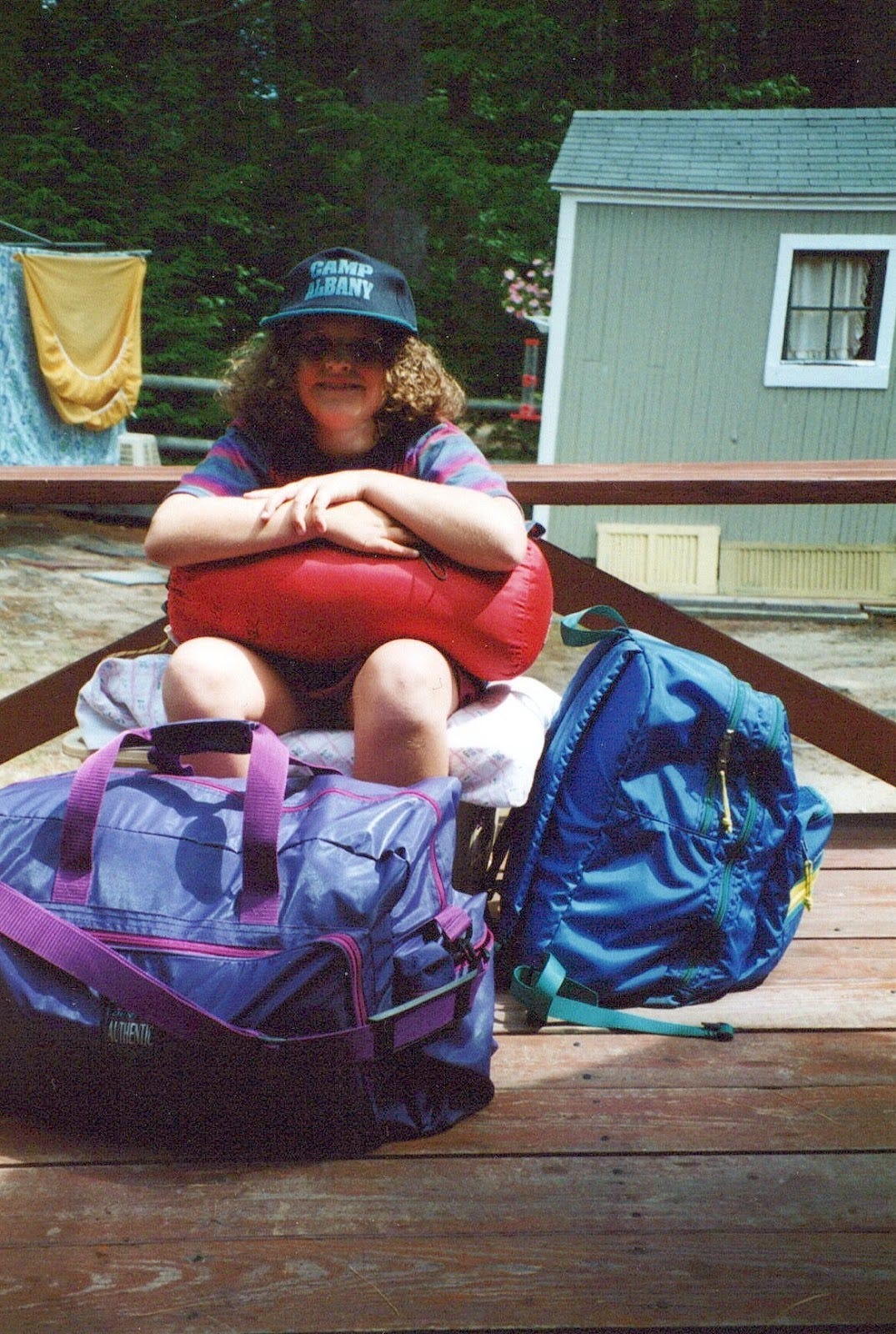
I finally became a camp kid in the summer of 1995 when I was eight going on nine about to head into fourth grade. I attended Camp Albany in New Hampshire, a Girl Scout camp in its final season. The counselors all had cute nicknames like Loaf or Cache or Sphinx. Albany (and the three other Girl Scout camps I attended) offered multiple two-week camp sessions throughout the summer. Within each session you could register for an age-appropriate group focused around a specific activity: arts, swimming and boating, hiking and nature, sports, theater, and most importantly: horseback riding. Despite being a water baby, I was above all a Horse Girl.6
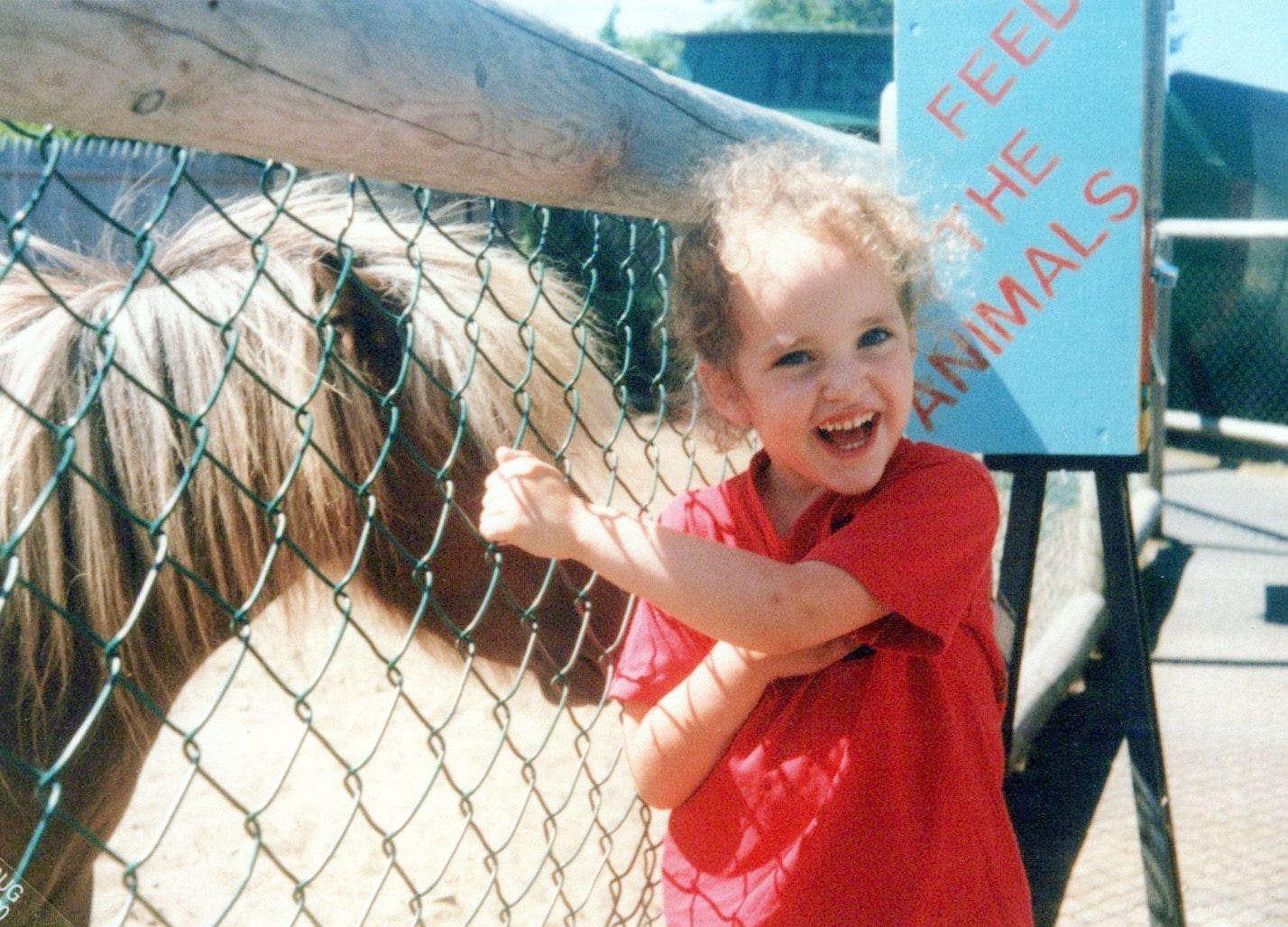
My first two summers at camp, I signed up for horseback riding. Horses seemed like four-legged gods: powerful, impossible, and somehow all-knowing. While humans have domesticated horses, it was as if they made the choice to be ridden, not letting us know that they’re in on the joke. The first time I mounted a horse, I almost did so backwards. I put my left foot into the right stirrup, and the instructor asked me what I thought was wrong about my approach. I was eight. I had no idea. I kept going until she corrected me. Once I finally mounted that horse, I felt about 10 feet tall. I was both at the mercy of and in control of this incredible and wise creature, one who was very patient with me as I consistently led it to the corner of their pen instead of in the neat circles my cabinmates were doing. It didn’t matter: I felt infinite.
Camp Albany (as well as Camps Chenoa, Farnsworth, and Kettleford) gave me so much: I helped build a pedestrian bridge over a creek;7 I learned how to make campfires and put up tents; I hiked for a week on the Appalachian Trail;8 I canoed for a week down the Connecticut River between Vermont and New Hampshire;9 and kayaked through mangroves and snorkeled in the pale turquoise waters of Key West.
Camp also instilled in me my love of performing. At 10, I was cast as one of the T-Birds in the Camp Kettleford production of Grease because I was one of the tallest girls. This was a very unauthorized version; we developed the scripts by listening to the soundtrack and writing down the lyrics. Our counselor/directors made our Grease G-rated with some innocent lyric swaps.10 I’m sure it was a terrible production—a bunch of girls all trying to sing the melody with no intention of harmonizing—but it was my everything. This too felt infinite.
A few years later I was cast as as Lysander in a truncated version of A Midsummer Nights’ Dream at Camp Farnsworth. We wore bedsheets over our bathing suits as makeshift togas, and carried our scripts in big plastic binders; Shakespeare is a lot to memorize in a week when you’re 13. I probably would have still found my way to theater and performance without camp, but it feels all the sweeter that some of my earliest performances were ones that I helped create from the ground up, learning how to use the stage, how to project, and how to direct.

Camp is where I learned the misinformation shared amongst children; the benign kind that is passed along like a game of telephone that we all accepted as the truth, no additional verification needed. At Albany, one girl told me that if I had freckles on my upper chest that I would get my period early; I diligently watched for freckles after that. Camp is also where I learned what each of the bases meant, how to judge my compatibility with a crush based on the numerology of our names, and where I told my cabinmate that I understood what the “69” she had drawn all over the walls meant.11
Camp is also where I was when my parents split. That summer I opted to do two sessions at Camp Farnsworth in Vermont: one backpacking and one canoeing. Things had been tense between my parents for a while, but when I left for my first session laden with what felt like the largest framepack that ever existed, I could sense something was different. My parents had been arguing loudly, no longer able to hide it with heightened whispers at midnight. During the weekend at home between sessions, my parents shared the news. I spent the next session gliding my paddles through the water, pondering which parent I should live with. When I got back for good, my father was gone, and my mom had boxed up many of our belongings, ready to go to our new home a few miles away. My time away from the fraught tension of the house helped me to get outside myself, to come to peace with their decision, and let me focus on the natural beauty surrounding me. Camp saved me a lot of heartache and pain.
Most of all, camp was where I started to learn self-reliance. In my first week at Camp Albany, I wrote to my parents daily begging them to let me come home. I was deeply homesick and wanted to get back to my dogs and the routines I knew innately. My mom dutifully wrote me each day, ensuring that I had a piece of home to comfort me while I was away. My grandparents wrote sweet notes, enclosing crisp $5 bills to use at the camp store. Once I allowed myself to engage in the daily activities, new routines, songs, and stories of the fellow campers, I got to be myself. The letters were a boon, not a crutch. I could be my own person, and find my flashes of infinity. Camp gave me a lot of self-confidence, bravery to get on stage, the drive to carry half my weight on my back and sleep outdoors, the skill to survive in the woods, the strength to make life-altering choices, and the comfort to just be the weird person I am.
This was how I felt endless possibility: I was being shown that anything was possible and that I could do it.
Once I reached high school, I became deeply involved with the YMCA Leader Corps, a program for teens to learn about life and leadership. Perhaps subconsciously I craved a program like the Girl Scouts that would connect me with people my age I’d never otherwise meet, where I could learn and grow, and find new parts of myself. Leader Corps brought me to Camp Pa-Gon-Ki,12 the Nutfield Y’s day camp on the other side of my hometown, as a counselor. I spent three summers there, ages 15-17, charged with caring for elementary school-aged kids. Campers were broken up by grade and named after a nut (this was the Nutfield Y after all), and each group had three counselors. My first summer I had rising first graders; my next two summers gave me a group of kids as rising fourth and then fifth graders. Having the same group of campers two years in a row was both a blessing and a chore.
Being a camp counselor meant long days in the sun supervising children that ranged from feral to diva to chill for next to no money. But I loved it. I got to take the kids on field trips to some of New Hampshire’s best lakes and beaches—and one that was so rocky that we had to pack extra bandages as inevitably at least one kid would cut their foot. I made many creations in crafts, led the campers in improv games during theater time, learned the updated versions of Miss Mary Mack, and watched Shrek during rainy days more times than I could count.
I can still remember specific campers and their little weirdsies. There was the little boy who couldn’t pronounce Rs and Ts yet and asked “Miss Heaver, are you a teenageuh?” and then “Are you mawwied?”—to a six year-old, a teenager was as adult as you could get without being their parent. The odd but endlessly delightful boy who said “Llama cheese tastes like cake!” in a charming prepubescent voice. The boy who liked to sing AC/DC songs with me. The adorable kid who tried to sneak extra Chaco Tacos when the ice cream truck came on Fridays. The sweet girl who told jokes so good I’d repeat them to my mom. The dramatic girl who couldn’t yet understand her emotions and would go from laughing to crying in two seconds flat. The older counselors in training who were toeing the line between childhood and the beginning stages of adulthood; driven by hormones, and a need to grow up fast coupled with a fear of leaving what they knew behind.13
Being a counselor finally checked off the summer camp expectations and dreams I had as a child: a coed camp, crushing on fellow counselors, getting to participate in all-camp competitions. There was no big end-of-summer dance, but making unique memories with my classmates (and the occasional counselor party) more than made up for it. It reinvigorated that same sense of wonder that I felt as a child watching Salute Your Shorts on my living room floor.
As a counselor, I tried to instill in my campers the same thrill and pure love I had for camp. That every day was a new beginning and offered infinite possibilities. That thinking about their choices gave them more opportunity to grow and be the wisened adults they also longed to become. I developed an individual relationship with each one to make them feel a certain comfort, even though home was there for them at the end of each day. Letting them know they were seen and valued. While I wasn’t always as patient as I could have been, or handled situations in the way they should have been handled, I just tried to be myself. That weird person who found themselves at camp not even a decade before.
Sometimes I think about my campers and wonder how they’re doing. If I come to mind when they think of their summers at Pa-Gon-Ki (and hopefully that they remember me as the fun—but responsible—counselor). Where they went to college, what they do now, if they’re now dropping off their own children at summer camp. What has made them feel infinite. If their experience at camp was as formative as it was for me, and as I tried to make it for them. That they had endless possibilities at their feet. I hope they’re all happy and thriving—even the feral ones.
Camp isn’t always the perfect experience—it coincides with the awkwardness of puberty and self-discovery—but it’s hard to think of camp without the warm fuzzies of nostalgia. Camp is limited and limitless; bound to a specified time and place, but opens the door to wherever your imagination takes you.
Just like Camp Anawanna, I hold the nostalgia of endless possibilities and infinity in my heart.
The show’s theme song is imprinted on my brain, and honestly it’s still a bop.
This was where someone would hold a tennis racket to your bare stomach—creating a waffle grid—and then cover you in syrup and whipped cream, while everyone else would stand around chanting “Awful Waffle!” A fate worse than death.
I didn’t know I was queer yet; I could have!
Although I do fondly recall a scavenger hunt-type event where each cabin had to find counselors hidden around the camp dressed as different musicians and figure out who they were. We were eight and nine. We had no idea.
I really wanted to meet this expectation; Mindy and I kept up a correspondence for another year or so before her letters stopped coming. Mindy, if you’re reading this, can I have my prom photo back?
Horse Girls are obsessed with horses to a point that is probably unhealthy. While I never got that far, I did bury myself in Saddle Club books—think Babysitter’s Club but horses. My obsession mostly stayed within me; being a Horse Girl is an expensive personality trait.
I hope it’s still there!
Vermont’s portion is called the Long Trail. Those in the know call it the AT/LT.
At the time, Vermont still didn’t have 911. Had there been an emergency, we would have had to paddle across the river to New Hampshire to call. Isn’t that wild?!
“We made out under the dock” became “we hung out under the dock.” How romantic!
When I asked, she said “What does it look like?” I was 11. I had no idea. I said “Oh yeahhhhhh” because I thought it was just sperm hanging out with each other.
I believe Pa-Gon-Ki was the Abenaki word for the local land.
Who also put a plastic tray in the oven when the campers were all making their own pizzas.




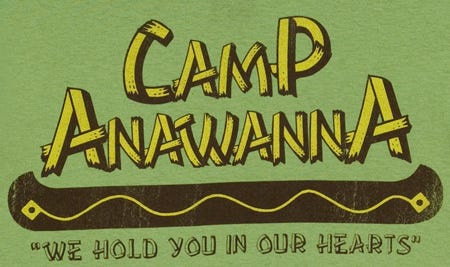
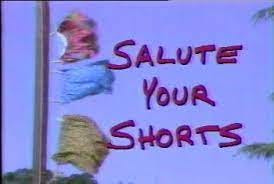

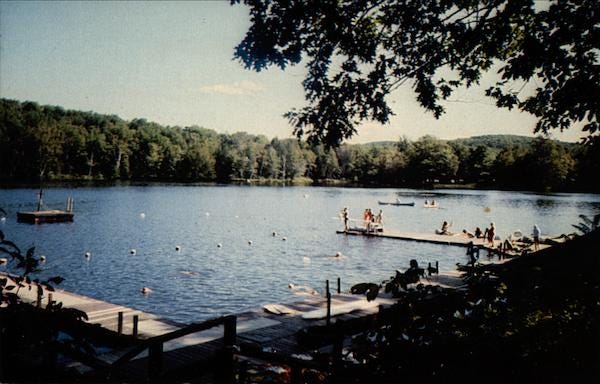
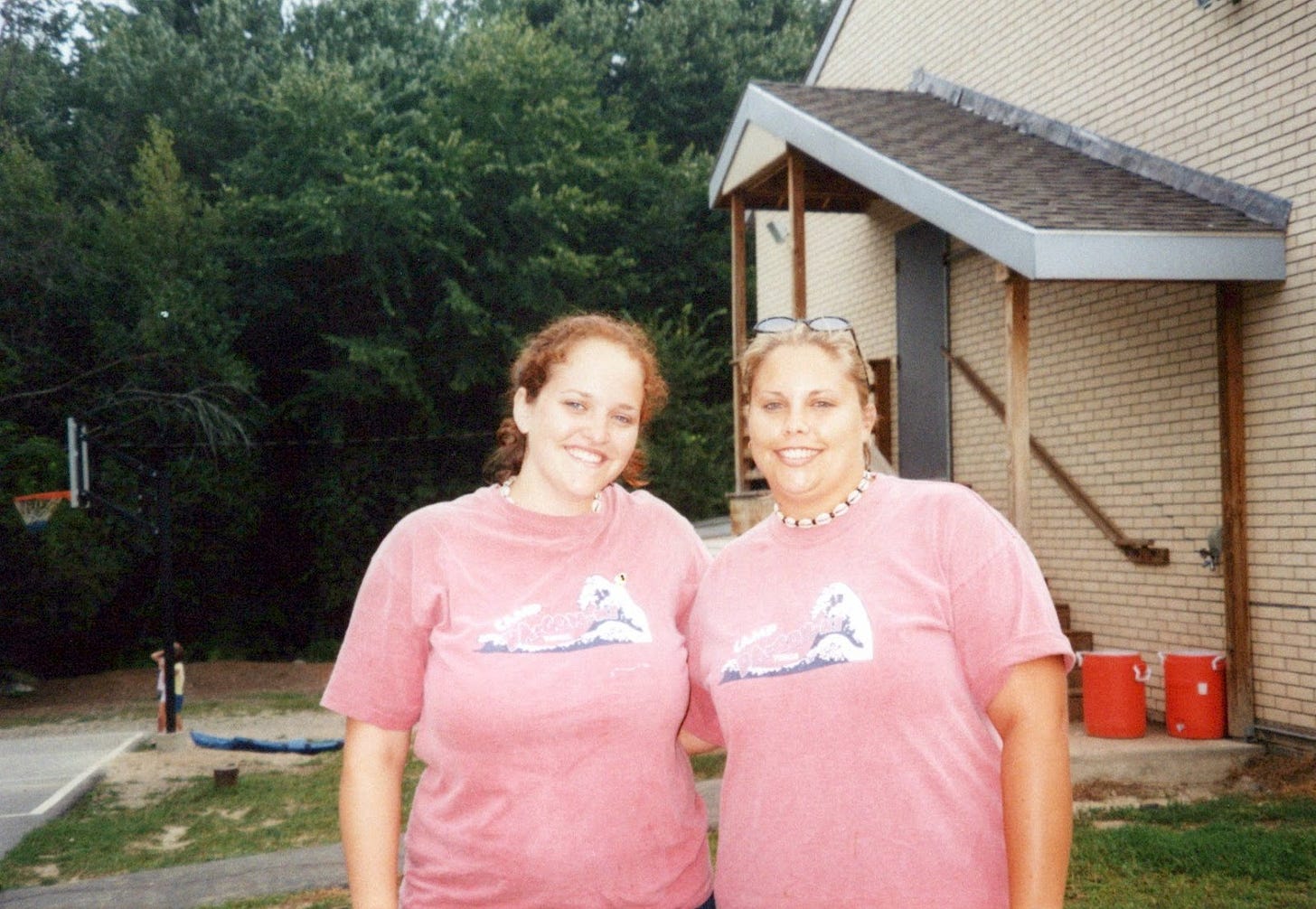
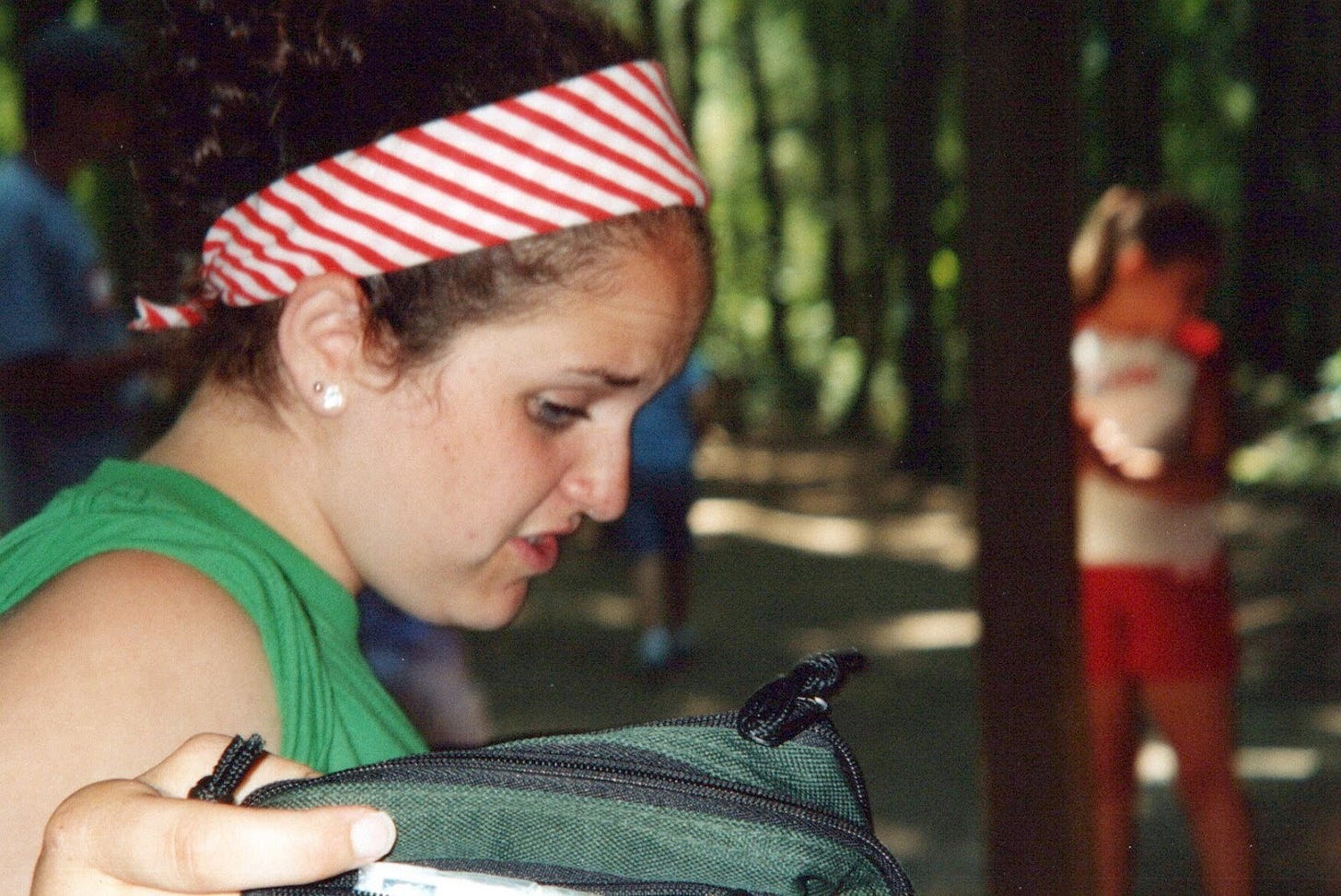
Love this! Remembering your stories, those initially plaintive letters that soon turned enthusiastic and excited about camp experiences, and all the packing and preparation to make sure you had everything you needed. Great photos!